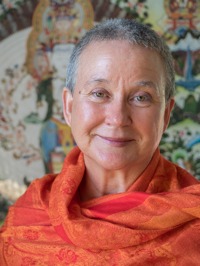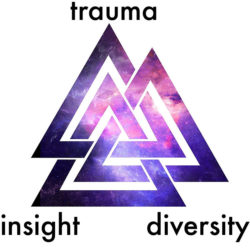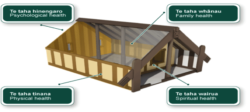 Isa Gucciardi, PhD, holds degrees and certificates in transpersonal psychology, cultural and linguistic anthropology, comparative religion, hypnotherapy, and transformational healing. She has been a dedicated Buddhist practitioner for forty years and has spent over thirty years studying spiritual, therapeutic, and meditative techniques from around the world. Isa has worked with master teachers of Buddhism, Christianity, Judaism and Sufism, as well as expert shamanic practitioners from a variety of traditions. Isa is the creator of Depth Hypnosis, a groundbreaking therapeutic model that has won rave reviews from psychotherapeutic and spiritual counselors alike. Isa teaches and speaks nationally and internationally, and has published numerous articles, podcast episodes, videos, and the books Coming to Peace and Return to the Great Mother.
Isa Gucciardi, PhD, holds degrees and certificates in transpersonal psychology, cultural and linguistic anthropology, comparative religion, hypnotherapy, and transformational healing. She has been a dedicated Buddhist practitioner for forty years and has spent over thirty years studying spiritual, therapeutic, and meditative techniques from around the world. Isa has worked with master teachers of Buddhism, Christianity, Judaism and Sufism, as well as expert shamanic practitioners from a variety of traditions. Isa is the creator of Depth Hypnosis, a groundbreaking therapeutic model that has won rave reviews from psychotherapeutic and spiritual counselors alike. Isa teaches and speaks nationally and internationally, and has published numerous articles, podcast episodes, videos, and the books Coming to Peace and Return to the Great Mother.
She maintains a private practice with institutions and individuals in Depth Hypnosis and Coming to Peace processes. Isa speaks five languages and has lived in eleven countries. She is the mother of two children and lives with her partner in San Francisco. She is the founding director and primary teacher of the Foundation of the Sacred Stream. For more information about training opportunities and to learn more about Isa’s upcoming workshop on Plant Medicine: Preparing & Integrating the Experience, go to www.sacredstream.org.
ACISTE recently had an opportunity to interview Isa about her views on the use of psychotropic plant medicine for psychological and spiritual transformation. Given the recent resurgence of clinical interest in the use of psychedelics for treating mental health concerns, we hope this two-part (Feb/Mar) interview will encourage therapists and others to further educate themselves about the unique integration needs of those who choose to engage plant medicine for healing and guidance.
____________
Q: What is your perspective on why plant medicine journeys have become so popular in recent years?
There is a serious existential crisis in many western societies at this time. This is a function of the deterioration of the social fabric there. The rise of social polarization across the planet and the cultivation of a culture of “no compassion” in the U.S. contribute to people becoming increasingly desperate for answers and meaning. The traditional sources for finding meaning are frayed as well – churches whose ministers are abusing children and overloaded mental health care providers who are unable to provide the level of assistance they have in the past, as two examples.
I think people are looking for answers in new places – and many people are finding them through the experience of plant medicines. As they speak about their experience, others are interested in trying them as well. There is also a more esoteric answer, which has to do with the intentionality of the plants themselves, but I think that answer requires a bit more context in order to make sense to most people.
Q: What are the greatest challenges to integrating the powerful insights and awareness these journeys can offer?
One of the greatest challenges is that as humans, we are ‘human-centric.’ We tend to value our own ways of knowing and seeing over the intelligence of other forms of life. Most people don’t even consider that other life forms have their own intelligence. This makes it hard for people to think of plants as intelligent beings whose biochemistry may offer insights to our own ways of processing information.
This lack of awareness extends beyond just turning to plants for assistance. It also extends into the processes of integrating the insights we receive from ingesting the plant medicines. In a way, it is actually a problem of translation. Most people do not understand the ‘language’ of image and …
 Marieta Pehlivanova, PhD, is a junior researcher at the Division of Perceptual Studies at the University of Virginia. Dr. Pehlivanova’s work at the Division focuses on near-death experiences, children reporting past-life memories, as well as other unusual experiences. Marieta holds a PhD in Experimental Psychology from the University of Pennsylvania and a Bachelor’s degree in Statistics from American University. Prior to her academic work, she pursued a career as a statistician in medical research. In addition to her academic work in human consciousness phenomena, Marieta is also personally interested in the exploration of consciousness. You may contact Marieta at mp8ce@virginia.edu if you have questions about the study outlined in this article or any future research opportunities. If mental health professionals would like to participate in the current research, please click here.
Marieta Pehlivanova, PhD, is a junior researcher at the Division of Perceptual Studies at the University of Virginia. Dr. Pehlivanova’s work at the Division focuses on near-death experiences, children reporting past-life memories, as well as other unusual experiences. Marieta holds a PhD in Experimental Psychology from the University of Pennsylvania and a Bachelor’s degree in Statistics from American University. Prior to her academic work, she pursued a career as a statistician in medical research. In addition to her academic work in human consciousness phenomena, Marieta is also personally interested in the exploration of consciousness. You may contact Marieta at mp8ce@virginia.edu if you have questions about the study outlined in this article or any future research opportunities. If mental health professionals would like to participate in the current research, please click here. from Melbourne, Australia. She has recently completed her dissertation on the topic of spiritual emergence(y) and its relationship with psychosis and personality. Kylie’s work is inspired by her own personal experience. She believes that people around the world are “waking up” as we undergo a scientific and spiritual paradigm shift, catalyzing spiritual emergence(y) for individuals, as well as on a global scale. Kylie has published articles in numerous academic journals and has presented her work at local and international conferences. She is a wife, mother, and Transpersonal Counselor. She also considers herself a spiritual emergence(y) experiencer. In this article, she shares the results of her dissertation. You may contact Kylie via email at
from Melbourne, Australia. She has recently completed her dissertation on the topic of spiritual emergence(y) and its relationship with psychosis and personality. Kylie’s work is inspired by her own personal experience. She believes that people around the world are “waking up” as we undergo a scientific and spiritual paradigm shift, catalyzing spiritual emergence(y) for individuals, as well as on a global scale. Kylie has published articles in numerous academic journals and has presented her work at local and international conferences. She is a wife, mother, and Transpersonal Counselor. She also considers herself a spiritual emergence(y) experiencer. In this article, she shares the results of her dissertation. You may contact Kylie via email at  psychology, cultural and linguistic anthropology, comparative religion, hypnotherapy, and transformational healing. She has been a dedicated Buddhist practitioner for forty years and has spent over thirty years studying spiritual, therapeutic, and meditative techniques from around the world. Isa has worked with master teachers of Buddhism, Christianity, Judaism and Sufism, as well as expert shamanic practitioners from a variety of traditions. Isa is the creator of
psychology, cultural and linguistic anthropology, comparative religion, hypnotherapy, and transformational healing. She has been a dedicated Buddhist practitioner for forty years and has spent over thirty years studying spiritual, therapeutic, and meditative techniques from around the world. Isa has worked with master teachers of Buddhism, Christianity, Judaism and Sufism, as well as expert shamanic practitioners from a variety of traditions. Isa is the creator of 
 intersection of bipolar disorder and spiritual awakening. He is the author of
intersection of bipolar disorder and spiritual awakening. He is the author of  The Mad Triangle is extremely expansive, and so it cannot possibly be given justice in a blog post. My hope here is simply to provide a few basics, leading someone into self-identified healing and social locations that may be further explored as desired. By self-selecting psychological and neurological discomfort, folks are empowered to self-determine which aspects of their experiences are problematic, which are special and/or gifts, which are simply divergent experiences, and which experiences are the result of violence, marginalization, and/or systemic oppression.
The Mad Triangle is extremely expansive, and so it cannot possibly be given justice in a blog post. My hope here is simply to provide a few basics, leading someone into self-identified healing and social locations that may be further explored as desired. By self-selecting psychological and neurological discomfort, folks are empowered to self-determine which aspects of their experiences are problematic, which are special and/or gifts, which are simply divergent experiences, and which experiences are the result of violence, marginalization, and/or systemic oppression. Physician and MD-Psychotherapist, author, and public speaker, previously on faculty at the University of Toronto, Faculty of Medicine. She is the person who first coined the phrase “Spiritually Transformative Experiences” (STEs) and defined five major categories of STE experience. She was the first Canadian medical doctor to specialize in the research and counseling of patients with Spiritually Transformative Experiences. A renowned international expert on STEs, she has had four Near-Death Experiences herself. She was a founding member of the Kundalini Research Network, the Canadian Coordinator of the Spiritual Emergence Network, the founder of the Spiritual Emergence Research and Referral Clinic, and co-founder of the Spirituality in Health-Care Network. She has four published books, and her most recent is
Physician and MD-Psychotherapist, author, and public speaker, previously on faculty at the University of Toronto, Faculty of Medicine. She is the person who first coined the phrase “Spiritually Transformative Experiences” (STEs) and defined five major categories of STE experience. She was the first Canadian medical doctor to specialize in the research and counseling of patients with Spiritually Transformative Experiences. A renowned international expert on STEs, she has had four Near-Death Experiences herself. She was a founding member of the Kundalini Research Network, the Canadian Coordinator of the Spiritual Emergence Network, the founder of the Spiritual Emergence Research and Referral Clinic, and co-founder of the Spirituality in Health-Care Network. She has four published books, and her most recent is  As well as in her own book,
As well as in her own book,  writing teacher and videographer, who has directed meditation retreats since 1980. Bill was a student of Chögyam Trungpa Rinpoche and taught classes in meditation, creative writing, and poetry at Naropa University for thirteen years. In addition to several films, he authored the book,
writing teacher and videographer, who has directed meditation retreats since 1980. Bill was a student of Chögyam Trungpa Rinpoche and taught classes in meditation, creative writing, and poetry at Naropa University for thirteen years. In addition to several films, he authored the book,  and consultant with over 20 years of experience. His book,
and consultant with over 20 years of experience. His book,  Our model of care is
Our model of care is